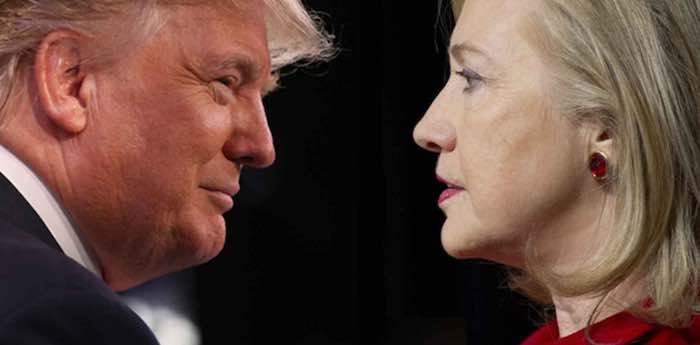By Matthew Vadum ——Bio and Archives--November 8, 2016
American Politics, News | CFP Comments | Reader Friendly | Subscribe | Email Us

Support Canada Free Press

The latest numbers show declines in voting from blacks in North Carolina — a drop-off after historic levels for Barack Obama in 2008 and 2012. But higher turnout by Latinos, who often lean Democratic, may be buoying Clinton in Florida. Both are must-win states for Donald Trump. The Hispanic vote is also surging in Nevada and Colorado, where Democrats are running near or above their successful 2012 pace. Trump could be holding an edge in Ohio and Iowa, but that won't be enough if Latinos drive Clinton to victories in other battleground states.Some polling suggests Trump is making inroads into the black vote, which is normally overwhelmingly Democrat. “We’re showing Donald Trump doing far better among African-Americans than any other Republican in modern memory,” John Yob, CEO of Michigan-based polling firm Strategic National told Breitbart News. Trump “has done an excellent job in campaigning for the votes of African-Americans,” he said, partly by campaigning in Detroit, which conservatives regard as a symbol of the failure of left-wing policies. The Breitbart article continues:
Trump is gaining in Michigan partly because many African-American voters — especially younger voters who backed Sen. Bernie Saunders [sic] — distrust Clinton, said Wayne Bradley, state director of African-American engagement for the Michigan Republican Party. “There is a tremendous trust deficit with Hillary Clinton” because tough anti-crime laws established when her husband was president in the 1990s, he said. That distrust has helped cause a sharp drop in the number of absentee ballots mailed in from Detroit, even as other part of the state send in more ballots that before, Bradley said. Faced with a low turnout, the Clinton campaign is trying to frighten African-Americans to vote, but “that’s not a convincing enough argument,” he said.At midnight voters in three tiny communities in New Hampshire participate in a quadrennial civic pageant, casting their first-in-the-nation ballots and tallying them up immediately. When the inhabitants of Dixville Notch voted this morning, there were four votes for Clinton, two votes for Trump, one vote for Johnson, and one write-in for 2012 GOP candidate Mitt Romney. Trump received 16 votes in Millsfield, compared to Clinton’s four, and one write-in for Bernie Sanders. Hart’s Location reported 17 votes for Clinton and 14 for Trump. Those results are just as inconclusive as the polling has been in the current presidential race. Many believe polling understates Trump’s true support. Some pundits have been talking about “hidden” or “shy” Trump voters and how they might put the GOP candidate over the top. “Donald Trump performs consistently better in online polling where a human being is not talking to another human being about what he or she may do in the election,” said Trump’s campaign manager Kellyanne Conway. “It’s become socially desirable, especially if you’re a college-educated person in the United States of America, to say that you’re against Donald Trump.” Former Speaker of the House and Trump supporter Newt Gingrich says shy Trump voters could be worth a few percentage points. There is, of course, no way for pollsters to detect shy voters. "The very simple answer about hidden votes is that we have no way of proving them one way or the other," said pollster John Zogby, who believes the theory might be correct. "Our way of getting information is to talk to people about what they are going to do, not not talking to people," the Sydney Morning Herald quoted him saying. Supporters of the theory point to the “Brexit” vote in the United Kingdom on June 23. Polls suggested the No/Remain side would win in the referendum on whether that nation should remain in the European Union but in the end the Yes/Leave side won by four percentage points. Then there was the referendum a month ago in the South American nation of Colombia on a peace deal with the Marxist narco-terrorists of FARC. The Yes side, supported by the political establishment, was expected to win but the No forces prevailed with 50.2 percent of the vote. FiveThirtyEight founder statistician Nate Silver has been hedging in recent days, which ought to encourage Trump supporters. On Sunday he said on ABC’s “This Week” that even though "Clinton has about 270, so she's one state away from potentially losing the Electoral College," he said. Silver continued:
Clinton is a lot weaker in the Midwest where four years ago President Obama was leading in Ohio by four points. Clinton's probably a couple of points behind there. Iowa, maybe the best poll in the country, the Des Moines Register Poll showed her down seven points in Iowa, a state she'll probably lose. So the demographics for Clinton don't actually work as well when you underperform among white non-college voters.Clinton’s Electoral College “polling in the swing states is a little bit weaker than Obama's,” Silver said. “So in some sense, it's a deceptively large or small lead for Clinton in some ways whereas Obama had a bigger lead electorally than you'd think.” So this election could very well be a repeat of 2000 in which the Electoral College victor loses the popular vote. Only the electoral votes count in the end but not securing at least a plurality of the popular vote opens the door to questions about the winner’s political legitimacy. No matter which candidate wins, after an unusually acrimonious campaign season, questions about that person’s legitimacy are still likely to be raised.
View Comments
Matthew Vadum, matthewvadum.blogspot.com, is an investigative reporter.
His new book Subversion Inc. can be bought at Amazon.com (US), Amazon.ca (Canada)
Visit the Subversion Inc. Facebook page. Follow me on Twitter.